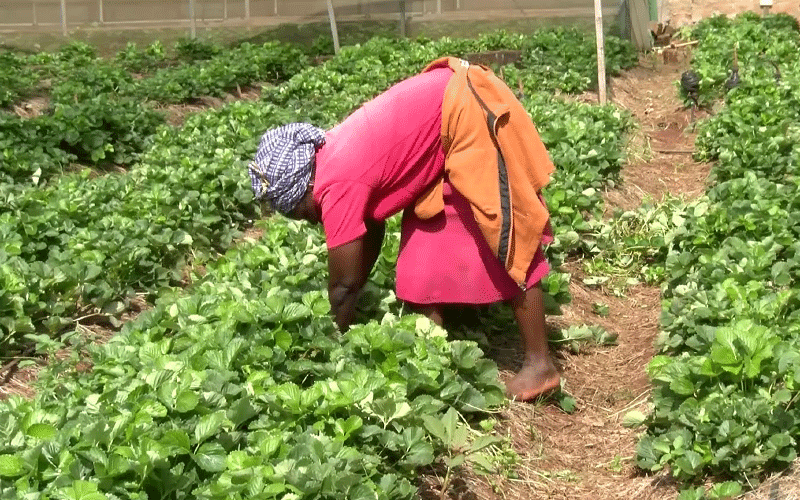Youth makes a fortune from strawberries farming

Having pursued a course in Agriculture, BENSON MAINA knew how to manage his farm well and his first proceeds motivated him to do more. He has since expanded his farm to two acres and plans to make it four acres.
Wangari Njuguna
At times when there wasn’t much to do at his home, Benson Maina would visit his neighbour who was a farmer. He used to help her weed the shamba.
One time he came across strawberries at his neighbour’s farm and the red fruit made him curios.
The neighbour gave Maina two vines for him to try the crop at his home. He planted them in a basin outside his house and soon they sprouted.
His elder brother opted to transfer the plants to the farm and here they did even better. The fruits were consumed by family members.
After completing his secondary school education, Maina considered making strawberry farming his own venture to make money.
His elder brother gave him some money to buy seedlings and to begin the venture, Maina got 2,000 seedlings.
“| picked on Pajaro as the first variety, but I would later go for chandler, which is better due to its higher productivity,” he remembers.
The proceeds motivated him. And having pursued a course in agriculture, Maina was capable of even managing a large farm well.

So from one acre of family land, he expanded to two acres and is now planning to get two more acres.
Green houses
The family has also adopted various ways of growing the berries. While some of the crop is grown on open field systems, others grow in green houses, hydroponics and even vertical gardens.
Maina says strawberry growing is much more profitable than coffee, tea or other crops as you can harvest for three years before replanting.
The plant takes three months to mature after transplanting from the nursery and the harvesting can be done throughout the year.
He has engaged four permanent workers to help him tend to the plants and occasionally hires casuals when there is too much work.
“We harvest twice or thrice a week and we get about 180kg per harvest,” he said.
Restaurants, food retailers, farmers markets and fruit vendors are among their major clients. With a kilogramme of the berries going for Sh350, Maina says this is a venture worth getting into.
“Though I never tried farming anything else, I think this is one of the best ventures to make money currently,” he said.
Crop challenges
Due to interest from neighbours, Maina has engaged 80 farmers into contract farming which helps boost quantity sold since market demand is rising. “We are looking for others to engage in strawberry farming,” he said.
To boost quality, Maina said practices organic farming as it gives better results compared to use of conventional farm inputs. 
He has also established his own nursery where he propagates seedlings, which he distributes to the farmers he has engaged.
This ensures there is uniformity in production. “Before signing a contract with any farmer, we train them on the best practices and this ensures we get similar results,” he explains.
The farming is not, however, without challenges. A major problem is getting the right quality for the seedlings as it is key in production of the berries and thus farmers might not be able to realise the rightful returns.
Pests such as thrips, spider mites, snails and ants also pose a threat to the berries. “With the help of agricultural experts, we have acquired organic folia that helps in controlling the pests” he added.
Recently he introduced the San Andreas variety to the other growers. Though it has similar production characteristics as chandler, its fruits are bigger and have a better flavour.
“This variety does well in warm areas as compared to the cold areas,” he said.
He encourages young people to stop grappling for white collar job slots, and instead get to the farm where they are bound to make more money to sustain their livelihoods.



